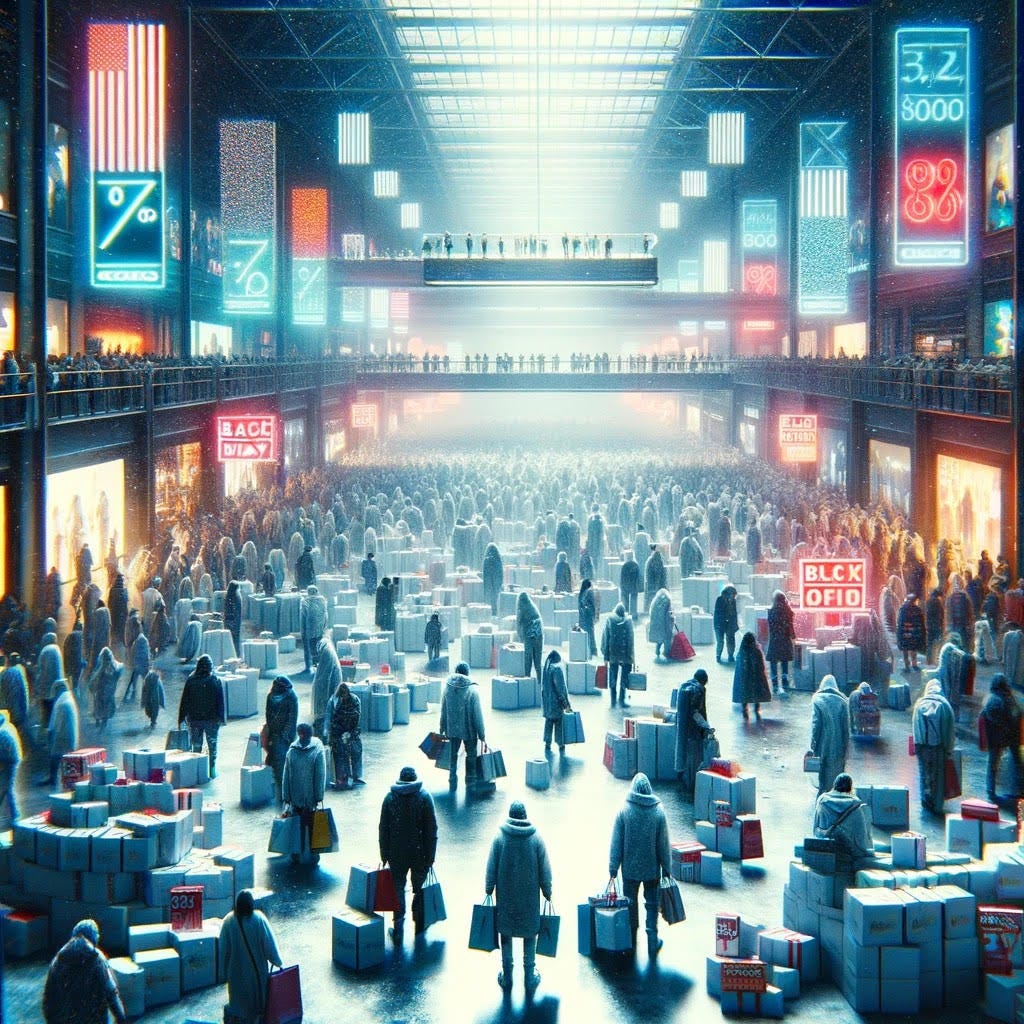Beware Black Friday
On Consumerism, Catharsis, and the Vast Distance In-Between
In our consumer culture, we always want the next best thing: the latest, the newest, the youngest. Failing that, we at least want more: more intensity, more variety, more stimulation. We seek instant gratification and are increasingly intolerant of any frustration. Nowhere are we encouraged to be satisfied with what we have, to think, “This is good. This is enough. —Esther Perel
That happiness is to be attained through limitless material acquisition is denied by every religion and philosophy known to mankind, but is preached incessantly by every American television set. —Robert Neelly Bellah
Above: AI’s conception of a “bleak, hyper-consumerist, American Black Friday Hellscape.”
If I had a dollar every time I read the words “Black Friday, “Deal,” or “Sale” since opening my eyes this morning, I would never have to shop Black Friday’s sales again.
Since the wee hours, commercials and texts and emails (oh my!) have hawked and pinged and binged here, there, everywhere.
This is no accident given our culture of consumerism. A quick search tells me that more emails are sent on Black Friday than any other day of the year. In fact, last year’s Black Friday bonanza dispatched over 141,000,000 emails to our respective inboxes.
Much ink has been spilt on the juxtaposition of Black Friday and Thanksgiving. Only in America can people jostle and push, scream and shout, rant and rave at others for sales just one day after reflecting on what they have with gratitude.
It would all be funny were it not so very sad: modernity measures success not in terms of love’s depth and compassion’s breadth, but the depth of our pocket and breadth of our dwelling.
To paraphrase Emile Gauvreau, we have become that strange race of people who spend their lives doing things they detest, to make money they don’t want, to buy things they don’t need, to impress people they don’t like.
This is not a recent phenomenon. Apocryphally, Black Friday symbolized the moment when retailers—traditionally operating “in the red” (indicating losses)—finally moved “in the black” (signifying profits) thanks to all of the sales happening after Thanksgiving.
To me, it represents something else altogether; Black Friday’s consumerism soils contentment via a toxic mix of greed and envy.
We cheapen our souls by spending our limited time and hard-earned money on superfluous shit.
We smother our spirit inhaling the smoky, insatiable fires of productivity and consumption.
We empty our wallets in an attempt to fill our lives.
When we peruse discount racks and sales aisles we seldom stop and think what’s for sale.
Our time?
Our finite energy?
Our precious souls?
This Black Friday, we ought spend fewer hours searching for the steepest sale and more time considering how we are selling ourselves—and those we love most—short.
Redemption cannot be bought at a register.
Buy less.
Choose well.
Make it last.
Know that you are—and have—enough.
On that note, I leave you with this obituary/poem Kurt Vonnegut wrote for The New Yorker:
True story, Word of Honor:
Joseph Heller, an important and funny writer
now dead,
and I were at a party given by a billionaire
on Shelter Island.
I said, “Joe, how does it make you feelto know that our host only yesterday
may have made more money
than your novel ‘Catch-22’
has earned in its entire history?”
And Joe said, “I’ve got something he can never have.”
And I said, “What on earth could that be, Joe?”
And Joe said, “The knowledge that I’ve got enough.”
Not bad! Rest in peace!
Per my about page, White Noise is a work of experimentation. I view it as a sort of thinking aloud, a stress testing of my nascent ideas. Through it, I hope to sharpen my opinions against the whetstone of other people’s feedback, commentary, and input.
If you want to discuss any of the ideas or musings mentioned above or have any books, papers, or links that you think would be interesting to share on a future edition of White Noise, please reach out to me by replying to this email or following me on Twitter X.
With sincere gratitude,
Tom


